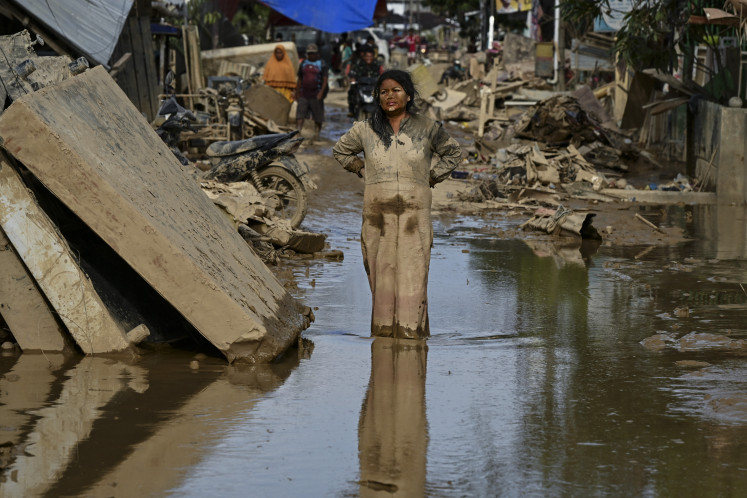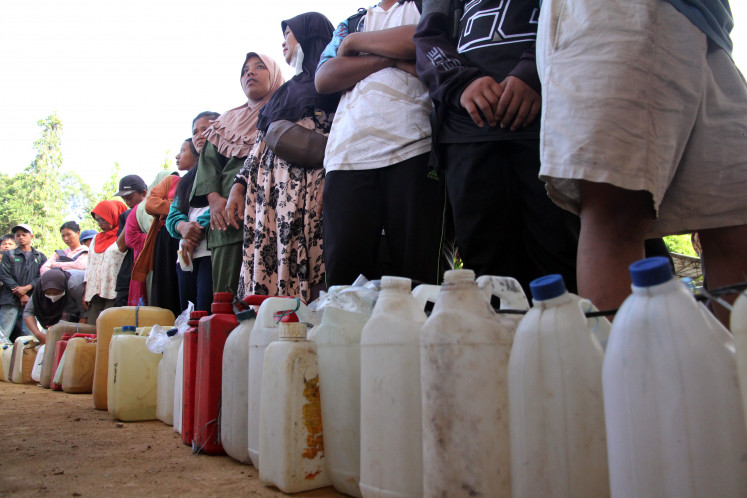Popular Reads
Top Results
Can't find what you're looking for?
View all search resultsPopular Reads
Top Results
Can't find what you're looking for?
View all search resultsIndonesia, Malaysia to send palm oil mission to EU
Indonesia and Malaysia have agreed to step up efforts to fight discrimination against palm oil and protect the industry by sending a mission to the European Union, which has issued a new policy to block the sale of palm oil.
Change text size
Gift Premium Articles
to Anyone
I
ndonesia and Malaysia have agreed to step up efforts to fight discrimination against palm oil and protect the industry by sending a mission to the European Union, which has issued a new policy to block the sale of palm oil.
At a meeting in Jakarta on Thursday between Coordinating Economic Affairs Minister Airlangga Hartarto and Malaysia’s Deputy Prime Minister and Plantations Minister Fadillah Yusof, the two countries agreed to send a joint mission to present scientific facts, economic benefits and industry best practices.
“We have agreed to protect the palm oil sector by strengthening [our] efforts and cooperation to deal with this discrimination. With regard to this unilateral move that could impact the palm oil industry, our meeting agreed to hold a policy dialogue with major importing countries,” Airlangga told a press conference afterward.
Fadillah, meanwhile, said Malaysia and Indonesia were in agreement on protecting the environment, including by practicing sustainable logging when clearing land for plantations.
“We always strive to comply with regulations on the palm oil industry, but they must be fair and understand the situation in both countries, where we try to help smallholders come out of poverty,” he said, as quoted by Malaysian state news agency Bernama.
Last month, President Joko “Jokowi” Widodo and visiting Malaysian Prime Minister Anwar Ibrahim agreed to stronger collaboration to develop the palm oil market and combat discrimination against the commodity.
“We have agreed to strengthen [our] cooperation through the Council of Palm Oil Producing Countries [CPOPC] to increase the market for palm oil and to fight discrimination against palm oil,” Jokowi said during a joint press briefing after the bilateral talks.
The EU issued in December a deforestation law obliging companies to produce a due diligence statement showing when and where their commodities were produced and provide verifiable information that they were not grown on land deforested after 2020, or risk hefty fines.
The regulation has been welcomed by environmentalists as an important step to protect forests as deforestation is responsible for about 10 percent of global greenhouse gas emissions.
Responding the regulation, Indonesia and Malaysia, the world’s largest palm oil producers, have accused the EU of implementing discriminatory policies targeting palm oil.
EU diplomats have denied the bloc is seeking to ban any imports of palm oil and said the law applies equally to commodities produced anywhere. The EU is the third-largest palm oil market for both countries.
Indonesia and Malaysia, which together control more than 80 percent of the world’s production, have pledged to work together to develop the palm oil market and to combat discrimination against the commodity.
"I have just spoken with [President Joko “Jokowi” Widodo] and we agree that there should be an OPEC-like organization to defend our interests in palm oil," Malaysia’s Prime Minister Anwar Ibrahim said during a lecture during his first foreign visit as prime minister to Jakarta.
“We have tried a united front since 2015, but it has not borne fruit yet,” he said, referring to the Council of Palm Oil Producing Countries (CPOPC), an organization of producing countries that both countries cofounded.
Malaysia has threatened that it could stop exporting palm oil to the EU in response to the new deforestation law.
Fadillah said last month that Malaysia and Indonesia would discuss the law, which bans sale of palm oil and other commodities linked to deforestation unless importers can show that production of their specific goods has not damaged forests.
"If we need to engage experts from overseas to counter whatever move by EU, we have to do it," Fadillah said.
"Or the option could be we just stop exports to Europe, just focus on other countries if [the EU] is giving us all a difficult time to export to them."










